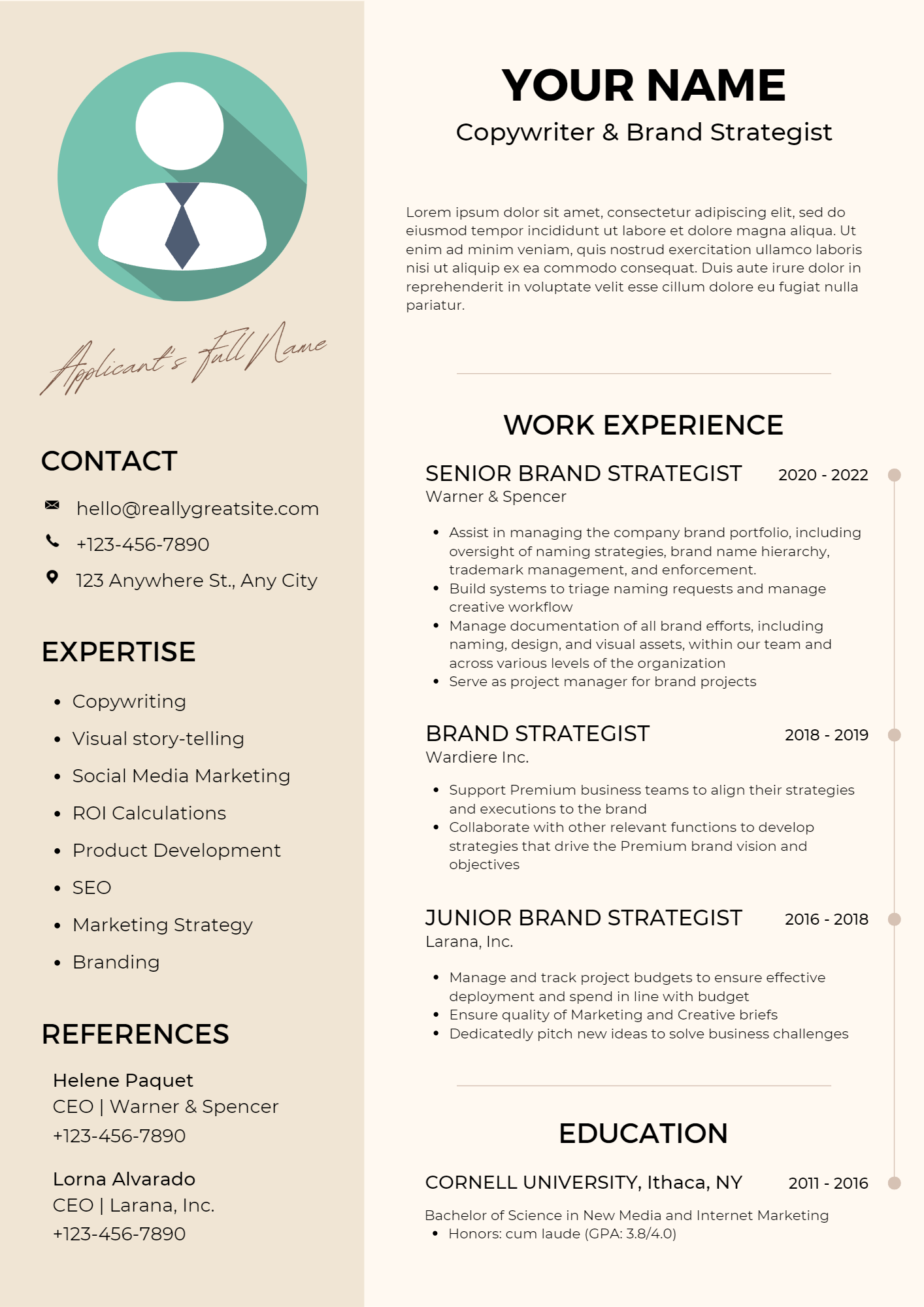Professional CV Tips & Sample CV Template
Increase your chance of getting a job by creating a a more professional CV, and with a clear layout that standouts.
Are you currently looking for a job, and want to know how to create an impressive CV for your potential employers that will stand out and increase your chance of landing the job? Well, you got to know more and how, firstly a CV lets you detail your educational background and academic achievements to show that you are well qualified for the position. Knowing how to impressively create your CV will surely leave a good impression on the interviewers. Read more and check out the sample CV template below…
How to format a professional CV
Here are the steps for writing a professional CV:
I. Create a header with your detailed contact information.
Your header should be at the top of
the page and include your name, phone number and email address so employers immediately know who you are and how to reach you.
II. Write a professional summary
Your professional summary is a short
bio that introduces you to the reader. This section sums up your best qualifications and explains your ideal career path.
III. Detail your educational background
Since a CV is often used for the academic job search process, it’s important to include a section on your
educational history. List your education in reverse chronological order, with your most recent degree first. Include both degrees you’ve earned and those
you’re pursuing.
IV. Provide your previous work experience
Detail all your practical work experience so your prospective employer can see your career path, including: Full-time and part-time employment;
Include the title of your position, the name, the location of your employer, and employment dates. Below this, list two to three bullet points that explain your job duties.
V. List your relevant skills and personal interests
List any abilities that apply to the potential job, such as foreign languages or a type of software. Try to include skills that relate to the job description to make yourself a more desirable candidate. Describe your personal interests (optional) You can choose to include a brief description of your hobbies and interests. Including a few hobbies may help you form a personal connection with the hiring manager.
VI. Include additional sections
CVs are usually longer than resumes so
you can detail all the achievements relevant to the potential role. Add sections as needed to list all of your accomplishments, including:
Related: Listing Accomplishments and
awards on your CV (With Examples)
VII. References
[List at least 3 people who can recommend you and give your good feedback, could be your previous employer or colleagues]



Before your interview, make sure to do the following:
As you are currently looking for a job, you have received an invitation for an interview. So, what do you do next;
and how should you prepare for it? Sending your application and receiving an invitation for a job interview is a good start, and as a new opportunity can unlock lots of possibilities, the thoughts of impressively presenting your skills, experience, and your ability to make a good first impression can give job seekers pressure at times. So, how would you ACE an interview then, read more to find out…
1. Research the company and interviewers
Understanding key information about the company you’re interviewing with can help you go into your interview with confidence. Using the company’s website, social media posts, and recent press releases will provide a solid understanding of the company’s goals and how your background makes you a great fit.
2. Practice your interview answers
Prepare your answer to the common question: “Tell me about yourself, and why are you interested in this role with our company?” The idea is to quickly communicate who you are and what value you’ll bring to the company and the role—this is your elevator pitch.
3. Reread the job description
You may want to print it out and begin underlining specific skills the employer is looking for. Think about examples from your past and current work that align with these requirements.
4. Use the STAR method
Prepare to be asked about times in the past when you used a specific skill and use the STAR method to tell stories with a clear Situation, Task, Action, and Result.
5. Practice answering questions with someone
Practicing your answers out loud is an incredibly effective way to prepare. Say them to yourself or ask a friend to
help run through common questions and your answers. You’ll find yourself gaining confidence as you get more used to saying the words.
6. Prepare a list of references
Your interviewers might require you to submit a list of references before or after your interview. Having a reference list prepared ahead of time can help you quickly complete this step to move forward in the hiring process.
7. Be prepared with examples of your work
During the interview, you’ll likely be asked about specific work you’ve completed in relation to the position. After reviewing the job description, think of work you’ve done in past jobs, clubs, or volunteer positions that show you have experience and success doing the work they require.
8. Prepare smart questions for your interviewers
Interviews are a two-way street. Employers expect you to ask questions: They want to know that you’re thinking
seriously about what it would be like to work there. Here are some questions you may want to consider asking your interviewers:
– Can you explain some of the day-to-day responsibilities this job entails?
– How would you describe the characteristics of someone who would succeed in this role?
– What are the challenges you’re currently facing in your role?

After you’ve spent time preparing, you can be successful on interview day by practicing these tips:
1. Plan your interview attire the night before
If you speak to a recruiter before the
interview, you can ask them about the dress code in the workplace and choose your outfit accordingly. If you don’t have someone to ask, research the company to learn what’s appropriate.
2. Have your CV copies, a notebook, and a pen
Whether it’s an online interview or an
on-site interview take at least five copies of your printed resume on clean paper in case of multiple interviewers. Highlight specific accomplishments on
your copy that you can easily refer to and discuss. Bring a pen and a small notebook for note-taking. Prepare to take notes, but not on your smartphone or
another electronic device. Write information down so you can refer to these details later in your follow-up thank-you notes.
3. Be ready for your interview at least 10–15 minutes earlier
Map out your route to the interview location so you can be sure to arrive on time whether it’s online or on-site interview. Consider doing a practice run before your interview day. If you’re taking public transportation, identify a backup plan if there are delays or closures.
4. Make a great first impression
Don’t forget the little things—shine your shoes, make sure your nails are clean and tidy, and check your clothes for holes, stains, pet hair, and loose threads. And remember to smile.
5. Treat everyone you’ll meet with respect
This includes those on the road and in
the parking lot, security personnel, and front desk staff. Treat everyone you don’t know as though they’re the hiring manager. Even if they aren’t, your
potential employer might ask for their feedback.
6. Win them over with authenticity and positivity
Being genuine during interview conversations can help employers easily relate to you. Showing positivity with a smile and an upbeat attitude can help keep the interview light and constructive.
7. Respond truthfully to the questions asked
While it can seem tempting to embellish your skills and accomplishments, interviewers find honesty refreshing and respectable. Focus on your key strengths and why your background makes you
uniquely qualified for the position.
8. Tie answers to your skills and accomplishments
With any interview question you answer, tie your background to the job by providing examples of solutions and results you’ve achieved in your career so far. Use every opportunity to address the requirements listed in the job description.
9. Keep your answers concise and focused
Remember: Your time with each interviewer is limited so be mindful of rambling answers. Practicing your
answers beforehand can help keep you focused.
10 . Don’t speak negatively about previous employers
Companies seek to hire problem solvers capable of overcoming tough situations. If you’re feeling discouraged about your current job, focus on what you’ve gained from the experience and what you
want to do next.
11. Ask about next steps
After your interview, it’s appropriate to ask either your interviewer, hiring manager or recruiter about what you should expect next. This will likely be a follow-up email with results from your interview, along with additional requirements like an assignment or reference list or another interview.
Although the interview process can be
daunting, preparation is the key to building your confidence and proving that you’re the best candidate. Learn how to ace an interview with these tips and succeed.
